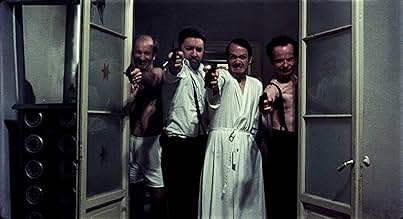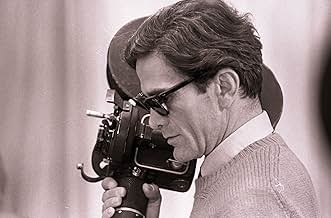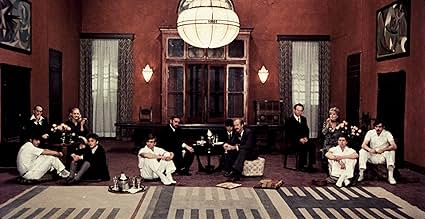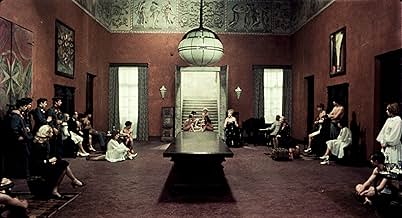
Reproduzir clip3:12
Assistir a If You Liked Terrifier 3, Watchlist These Endurance Horror Classics
Durante a Segunda Guerra Mundial na Itália, quatro fascistas encurralaram nove adolescentes e os submeteram a cento e vinte dias de torturas.Durante a Segunda Guerra Mundial na Itália, quatro fascistas encurralaram nove adolescentes e os submeteram a cento e vinte dias de torturas.Durante a Segunda Guerra Mundial na Itália, quatro fascistas encurralaram nove adolescentes e os submeteram a cento e vinte dias de torturas.
- Direção
- Roteiristas
- Artistas
- Prêmios
- 2 vitórias no total
Uberto Paolo Quintavalle
- Eccellenza
- (as Umberto P. Quintavalle)
Hélène Surgère
- Signora Vaccari
- (as Helene Surgere)
Resumo
Reviewers say 'Salò, or the 120 Days of Sodom' is a controversial film exploring power, corruption, and depravity. Based on de Sade's work, it depicts extreme abuse by fascists. Many find it disturbing yet artistically significant, while others criticize its graphic content and slow pace. Its examination of fascism and power abuse is noted, sparking debates on its artistic and moral value.
Avaliações em destaque
disturbing. this is the basic conclusion about the last film by Pasolini. denunciation of fascism and bourgeoisie. a masterpiece. last fight of Pasolini against his demons. disgusting. a trash. demonstration of madness. chaotic and boring and scatological. for me, it is only the end of a way. a kind of verdict. after a career in search of truth and beauty and the measure. Salo is a social and political manifesto. attack against hypocrisy and denunciation of the traces of fascism. a film as a form of exorcism. cruel and honest and hopeless. but, after 40 years, it is perceived in different manner. its message is suffocated by the violence of images. the temptation to discover it as portrait of consumerism is covered by the forms of eroticism. and about the waves of prejudices. it is a Pasolini. the last. this is only important thing. the rest - manifestation of personal perceptions.
Salo, the final film by Pasolini, is far and away the most affecting film I've ever seen of it's type. The images that it shows will stay with every viewer forever, they are unforgettable. Yet, you will wish you could forget them.
The film is about a group of rich Fascists during WWII-Nazi Occupied Italy, where they kidnap a group of 18 youngsters, allowing only physically perfect specimins to stay, and subject them to various forms of mental, physical and sexual torture over the next 120 Days. The torture starts off in a sexual nature--Sodomy, rape, humiliation and so on-- and slowly degrades and descends into mental and physical torture. Just when you think what you are seeing can't get worse, it does, ten-fold.
What makes Salo so brutally shocking and disturbing is its uncompromised and blunt way of showing the acts of horror. It is a very quiet and slow film, mostly shot using static and still cameras, it feels more like a documentary than a fictional film. It's clear upon viewing, that Pasolini wanted to remind us all that violence should not be entertainment. As such, every act of violence and degredation is drained of all its possible energy and excitement, and shown in a sad, painful light. Nothing is sugar coated, nothing is softened. This film is an attack on our desensitized feelings towards violence. Yet, at the same time, the film purposely desensitizes us to certain acts -- Such as rape. We see it so much during the film that it becomes "normality" to us, we barely raise an eyebrow. Upon realizing this, one also realizes how the horrible acts shown in the film are possible, and it's a terrible realization.
Salo continues to descend until at the end, when we are taken to the punishing grounds, where various rule breakers are tortured and murdered. This final sequence is the most harrowing and effective I've ever seen in a film. As the victims are tortured and murdered, each one of the fascist rulers take turns as voyer, watching from a second story window, far enough away to not hear the screams of terror and pain. And we watch with him. The film attempts to equate our viewing of this film to their viewing of the executions, after all, we're watching these acts for "entertainment", just as he is. And we distance ourselves from the acts in order to enjoy them, as he does by watching through binoculars far away. It's a savage and truthful attack, one that is impossible to deny.
Also incredibly unsettling is the inherent joy that the villains (Heroes?) feel at their victims pain, sadness and discomfort. Sometimes even to the point of sexual arousal. There is a scene where a girl is crying because her mother died trying to save her from these people. She is completely naked as she weeps, to us, she's the picture of vulnerability and sadness, to the fascists, it's the most exciting thing they've seen all day. The fascists all stand and watch her weep with the utmost sexualexcitement. It is terrifying. It's scenes like these that set Salo apart from other "gross out" movies. Some of the most affecting and frightening scenes are ones where there is quiet, watching the expressions and reactions of people to the various horrible acts.
Salo is a film of rage and sadness. It is a film that asks you to hate humanity, to hate what we're capable of; to look in the mirror and hate yourself. Then weep because nothing can be done about it. Nothing will ever change..
The film is about a group of rich Fascists during WWII-Nazi Occupied Italy, where they kidnap a group of 18 youngsters, allowing only physically perfect specimins to stay, and subject them to various forms of mental, physical and sexual torture over the next 120 Days. The torture starts off in a sexual nature--Sodomy, rape, humiliation and so on-- and slowly degrades and descends into mental and physical torture. Just when you think what you are seeing can't get worse, it does, ten-fold.
What makes Salo so brutally shocking and disturbing is its uncompromised and blunt way of showing the acts of horror. It is a very quiet and slow film, mostly shot using static and still cameras, it feels more like a documentary than a fictional film. It's clear upon viewing, that Pasolini wanted to remind us all that violence should not be entertainment. As such, every act of violence and degredation is drained of all its possible energy and excitement, and shown in a sad, painful light. Nothing is sugar coated, nothing is softened. This film is an attack on our desensitized feelings towards violence. Yet, at the same time, the film purposely desensitizes us to certain acts -- Such as rape. We see it so much during the film that it becomes "normality" to us, we barely raise an eyebrow. Upon realizing this, one also realizes how the horrible acts shown in the film are possible, and it's a terrible realization.
Salo continues to descend until at the end, when we are taken to the punishing grounds, where various rule breakers are tortured and murdered. This final sequence is the most harrowing and effective I've ever seen in a film. As the victims are tortured and murdered, each one of the fascist rulers take turns as voyer, watching from a second story window, far enough away to not hear the screams of terror and pain. And we watch with him. The film attempts to equate our viewing of this film to their viewing of the executions, after all, we're watching these acts for "entertainment", just as he is. And we distance ourselves from the acts in order to enjoy them, as he does by watching through binoculars far away. It's a savage and truthful attack, one that is impossible to deny.
Also incredibly unsettling is the inherent joy that the villains (Heroes?) feel at their victims pain, sadness and discomfort. Sometimes even to the point of sexual arousal. There is a scene where a girl is crying because her mother died trying to save her from these people. She is completely naked as she weeps, to us, she's the picture of vulnerability and sadness, to the fascists, it's the most exciting thing they've seen all day. The fascists all stand and watch her weep with the utmost sexualexcitement. It is terrifying. It's scenes like these that set Salo apart from other "gross out" movies. Some of the most affecting and frightening scenes are ones where there is quiet, watching the expressions and reactions of people to the various horrible acts.
Salo is a film of rage and sadness. It is a film that asks you to hate humanity, to hate what we're capable of; to look in the mirror and hate yourself. Then weep because nothing can be done about it. Nothing will ever change..
Pier Paolo Pasolini, as is well known, was murdered not long after he finished work on this, his most audacious and confrontational film, yet even the most casual viewing of SALO begs the question - had he not been murdered, would he have taken his own life anyway? Every sequence, every shot and practically every moment of this film is so burdened with despair, barely concealed rage and a towering disgust with the human race, one gets the impression that Pasolini was barely hanging onto life - and any attendant shreds of hope - by his fingernails. Although ostensibly an adaptation of one of DeSade's most depraved works channeled through the horrifying excesses of the Second World War with the Fascist ruling classes as its (authentically vile) villains, SALO also contains a lot of contemporary criticism - Pasolini hated the modern world, and explained the stomach-churning 'banquet of s**t' as a none-too-subtle attack on the encroaching global domination of the fast food chains. (The scenes of sexual excess can similarly be read as a despairing attack on the permissive society - those who come to SALO expecting titillation or B-movie sleaze will be sorely disappointed.) Beyond the nihilistic content, which has been well documented elsewhere, the film has an overall mood that seems to have been engineered to make the viewer thoroughly depressed. Shot on washed-out, faded film stock using primarily static cameras, long shots, choppy editing and very few cutaways, SALO has a visual style reminiscent of cinema-verite documentary. Add to this the unnerving use of big band music, piano dirges and the (intentionally?) scrappy post-dubbed dialogue, and the distancing effect on the viewer is complete. SALO comes across as one long primal scream of rage, designed to shake the viewer out of his complacency, and in this respect, the film succeeds unequivocally. Whether or not you would care to watch this more than once, or indeed for 'entertainment', is another matter, but SALO is an important film that demands a careful viewing ONLY by those prepared for it.
Pasolini made it quite clear in several texts that this is not an anti-fascist film, but rather that fascism is a symbol for something far more pervasive. He ultimately saw himself as a committed director, and thus all of his historical films are about the present, and this film was made in the 70's, not in the 40's. It is rather an anti-bourgeois film. (Pasolini's political enemies at the time were not fascists at all, but the Christian Democrats)...Furthermore it is NOT a defense of Sade, but an apology for his earlier writings and films which mythicized acts of violence and glorified them as the pure, unconscious, pre-verbal expression of the subproletariat. However Pasolini saw the riots of the bourgeois students in 1968 as nihilistic acts of revolt, not revolution--a revolt of the Bourgeoise against itself, as his poetry makes clear. He watched in horror as he saw his vision of true revolution twisted into a childish and merely destructive tantrum against the previous generation. And so it is the Bourgeoise, symbolized by Fascism, which he represents and condemns in Salo, in the guise of what he considered to be a medieval morality play. And it is in this context that he apologizes for having made statements like "Only a bloodbath can save the world" (1962), which is quoted in the film. Yet, like everything else, it has been appropriated by the bourgeoise, who misinterpret it first as Nietzsche, then as St. Paul, until it gets reduced to a merely absurdist Dada interpretation. The characters are continually misinterpreting the many structuralist citations, because they have no history. History has been destroyed, and thus Pasolini is trying to re-introduce it in the film. The revolution, by 1968, was impossible, as there was nobody left to fight it. The bourgeoise, Pasolini lamented, had subsumed everything into itself-there was no "other", only a technological god-like and all-inclusive power structure. But what is most shocking is that it is the Sadean libertarianism and the permissivness of that class that Pasolini finds most disturbing. He held that the permissiveness of the "anarchy of power" was more tyrannical than repression. He was most traumitized, oddly, by the increasing tolerance of homosexuals. And so truely Pasolini takes the side of Dante, not Sade. And finally, its ultimately a film about misinterpretation. What the characters say and what they do (as in Sade) are incongruent. He knew that he was to be misunderstood by his Bourgeois audience, as it misunderstood itself, Pasolini said that it was intrinsic that Salo remain enigmatic (on the model of Dante), and this is the film's real genius. Judging by most of these reviews, Pasolini made his point.
Reportedly, when the executives of one, now defunct, American film company saw "Saló", which they helped co-finance and had distribution rights on, they were so disturbed and embarrassed that they didn't know what to do. Are we going to release this thing? With our company name on it? Where?
They had to show that they released it somewhere in the U.S. or territories.
So they did. In a small theater in El Condado area near San Juan, Puerto Rico.
There's where I saw it. In the mid-70's. With the film company's name on it.
Is it any good? Well, I'm no great admirer of Pasolini. Frankly, I find his movies intolerable. And "Saló" is no exception. But, unlike his Trilogy of Life ("The Decameron", "Canterbury Tales", "Arabian Nights") where he at least displayed some flair and humor, this one is a different animal.
His style was always somewhat ponderous. In "Saló" it is heavily, oppressively didactic: static tableaux-style framing, a deliberately slow pace, no humor whatsoever, and actors who don't play characters but conceits. Although Pasolini uses De Sade's "120 Days of Sodom" as scaffolding and as a pointed commentary, "Saló" is actually based on real events that happened in the Republic of Saló in Northern Italy, where a group of wealthy fascists abducted a large group of young men and women, went on to debase them, and after they were done with them they killed them. Pasolini staged all the scenes as demonstrations of degradation and cruelty. And he does not flinch.
At the end he includes a bibliography.
It's an unpleasant experience.
Clearly, Pasolini, an award-winning poet and one of the leading intellectuals of his time, was very angry when he did this moving picture. He wanted to send a message to Italy and to the world.
It was his last film.
Months later he was murdered.
After several weeks of being in release, the theater was raided by our local vice authorities.
They had to show that they released it somewhere in the U.S. or territories.
So they did. In a small theater in El Condado area near San Juan, Puerto Rico.
There's where I saw it. In the mid-70's. With the film company's name on it.
Is it any good? Well, I'm no great admirer of Pasolini. Frankly, I find his movies intolerable. And "Saló" is no exception. But, unlike his Trilogy of Life ("The Decameron", "Canterbury Tales", "Arabian Nights") where he at least displayed some flair and humor, this one is a different animal.
His style was always somewhat ponderous. In "Saló" it is heavily, oppressively didactic: static tableaux-style framing, a deliberately slow pace, no humor whatsoever, and actors who don't play characters but conceits. Although Pasolini uses De Sade's "120 Days of Sodom" as scaffolding and as a pointed commentary, "Saló" is actually based on real events that happened in the Republic of Saló in Northern Italy, where a group of wealthy fascists abducted a large group of young men and women, went on to debase them, and after they were done with them they killed them. Pasolini staged all the scenes as demonstrations of degradation and cruelty. And he does not flinch.
At the end he includes a bibliography.
It's an unpleasant experience.
Clearly, Pasolini, an award-winning poet and one of the leading intellectuals of his time, was very angry when he did this moving picture. He wanted to send a message to Italy and to the world.
It was his last film.
Months later he was murdered.
After several weeks of being in release, the theater was raided by our local vice authorities.
Você sabia?
- CuriosidadesDespite the grim subject throughout the film, in an interview on the second disc of the Criterion Collection box set, actress Hélène Surgère claimed the mood was actually rather jovial on the set and that none of the teenage actors were actually harmed or traumatized. She said the abundance of teenagers who had never acted before led the mood to be happy and at times, even fun, with the cast often playing practical jokes on each other. She also said that the movie was literally "made" in the editing room and the filmmakers had no idea how grim a movie it was until they saw the finished product at the premiere.
- Erros de gravaçãoWhen the Duke kisses several victims during Sergio and Renata's wedding, some victims and Ezio begin to laugh, off the character.
- Citações
The President: [while eating a meal of feces] Carlo, do this with your fingers.
[the President sticks two fingers in his mouth]
The President: And say, "I can't eat rice with my fingers like this."
Male Victim: [with fingers in his mouth] I can't eat rice.
The President: Then eat shit, you little bastard.
- Cenas durante ou pós-créditosEssential Bibliography: Roland Barthes: 'Sade, Fourier, Loyola' (Editions du Seuil); Maurice Blanchot: "Lautréamont et Sade' (Editions de Minuit; in Italy Dedalo Libri); Simone de Beauvoir: 'Faut-il brûler Sade' (Editions Gaimard); Pierre Klossowski: 'Sade mon prochain, le philosophe scélérat' (Editions du Seuil; in Italy SugarCo Edizioni); Philippe Sollers: 'L'écriture et l'experience des limites' (Editions du Seuil)
- Versões alternativasThe film was rejected for cinema by the BBFC in 1976 and a private showing of the uncut version at the Old Compton Cinema Club in London's Soho resulted in a police raid and confiscation of the movie. A heavily edited version - minus 6 minutes of footage including scenes of torture, homosexuality and excrement eating, and including a 4 minute prologue describing the history of the town of Salo - was later prepared by UK censor James Ferman for club showings. The film was finally passed completely uncut for cinema and video in the UK in December 2000.
- ConexõesEdited into Histoire(s) du cinéma: Une histoire seule (1989)
- Trilhas sonorasPrelude in C minor
(uncredited)
Composed by Frédéric Chopin (uncredited)
Played by Arnaldo Graziosi (uncredited)
Principais escolhas
Faça login para avaliar e ver a lista de recomendações personalizadas
Detalhes
- Data de lançamento
- Países de origem
- Idiomas
- Também conhecido como
- Saló o los 120 días de Sodoma
- Locações de filme
- Empresas de produção
- Consulte mais créditos da empresa na IMDbPro
Bilheteria
- Faturamento bruto mundial
- US$ 1.808.595
- Tempo de duração
- 1 h 57 min(117 min)
- Mixagem de som
- Proporção
- 1.85 : 1
Contribua para esta página
Sugerir uma alteração ou adicionar conteúdo ausente

![Trailer [OV]](https://m.media-amazon.com/images/M/MV5BYTczYWExODUtNmQ3NC00MzRhLTkwMGQtNzRjM2M5ZGQzYmVkXkEyXkFqcGdeQXRyYW5zY29kZS13b3JrZmxvdw@@._V1_QL75_UX500_CR0)













